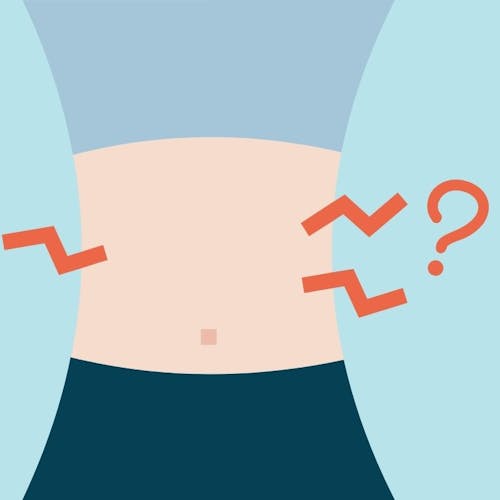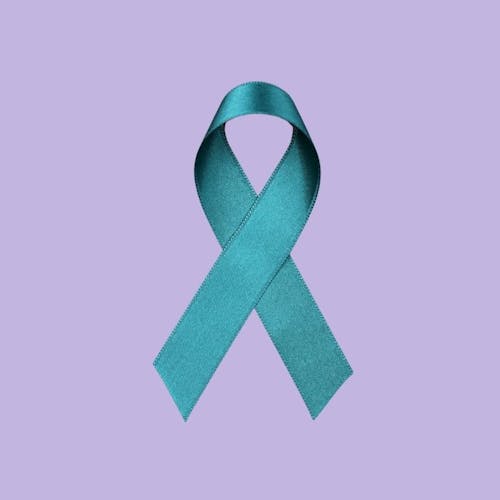This website uses cookies to enhance the user experience. By using Yoppie you are agreeing to our use of cookies.
Period Symptoms But No Period? What The Heck?
Written by Yoppie
18 Oct 2021
Anovulation
Ovulation pain (Mittelschmerz)
Birth control
Stress
A thyroid condition
PCOS (polycystic ovary syndrome)
Uterine polyps or ovarian cysts
PID (pelvic inflammatory disease)
UTIs
So you’ve got all the symptoms; cramps, bloating, acne, low mood… but no bleeding? One of the first things you may think of when you experience a missed period is pregnancy, and this is a possibility. But it turns out many other things could be the cause, too. Let’s take a look at what else could be to blame for those eerily period-like symptoms...
Anovulation
Ano-what now? If you’ve never heard of this before, you’re not alone. It’s rare, but it does happen so it’s good to know about if your periods aren’t appearing when they should. Anovulation is when your body skips ovulation (the part where the ovary releases an egg), but it still produces period symptoms.
It’s most common in the first year of having periods or in those approaching menopause, but it’s possible to have it at any age, particularly for those who exercise to extreme levels or have very high or low body weight. If you have anovulation and you’re trying to get pregnant, your doctor can usually offer treatment options and medications.
Ovulation pain (Mittelschmerz)
Ovulation pain (referred to as Mittelschmerz - German for "middle pain") is when you experience a one-sided pain in your lower abdomen while ovulating. It feels a bit like period cramps, which gives the impression of being on your period without there being any blood.
This shouldn’t stop you from having your regular bleed each month, but if you are feeling period-like symptoms roughly 14 days after, that pesky Mittelschmerz could be the cause. It’s nothing you need to fix, but if it’s causing you bother you may find a gentle massage or a hot water bottle resting on your abdomen could relieve some discomfort.
Birth control
Sometimes hormonal birth control can affect the heaviness of your flow, like an IUD (intrauterine device), which can sometimes lighten or stop periods. A 2016 study researched this in more than 1,800 subjects using the Mirena IUD and found that after one year of use, those who began with light or short periods were more likely to lose their period altogether.
However, the rest of the symptoms (like cramps, bloating, acne, etc.) were still there, so if you’re thinking of getting an IUD to stop all symptoms… no such luck. If you have an IUD and are no longer getting a monthly bleed, it’s nothing to worry about, but if you would prefer a regular period you can speak to your GP about switching to another type of birth control.
Stress
The rumours are true; stress can lighten or stop periods. While you may still experience the usual symptoms of periods, extreme stress can cause bleeding to stop. This happens when the hypothalamus (the part of the brain that controls your period) releases chemicals to trigger the pituitary gland to release estrogen and progesterone. When cortisol (the stress hormone) appears, it interferes with this process and can cause irregular or missed periods.
This could be one of the first things to rule out. Have you been very stressed recently? Have you gone through a major life change? If the answer is yes, think about how you can start to take care of yourself and de-stress to get back to full health.
Now on to some of the less common reasons, such as…
A thyroid condition
Hypothyroidism can cause infrequent or missed periods due to an increase in thyroid releasing hormone (TRH). High TRH levels tell the pituitary gland it’s time to release prolactin, which interferes with estrogen production. Among other symptoms this can lead to missed periods, so you may be getting your usual period symptoms but no bleed days.
PCOS (polycystic ovary syndrome)
PCOS has many symptoms, including irregular or missed periods, but you may still feel typical PMS symptoms throughout the month. PCOS is caused by high levels of androgens, which can - in some cases - prevent the ovaries from releasing an egg during ovulation. This can mean you get all the symptoms of your period minus the blood each month.
Uterine polyps or ovarian cysts
Uterine polyps are small growths on the inside of the uterus that are usually benign (non-cancerous) but can cause irregular periods. Similarly, an ovarian cyst is a fluid sac that grows on an ovary. Though symptoms are typically minimal unless there are complications, some people find they experience irregular periods, as well as bloating which could be mistaken for a PMS symptom.
PID (pelvic inflammatory disease)
Pelvic inflammatory disease (PID) is an infection that affects the womb, fallopian tubes and/or ovaries. Symptoms include pain in the lower belly (often mistaken for period pain) and vaginal discharge (another side effect of menstruation). Irregular periods are also a symptom of PID, so you may have suspiciously period-like symptoms but no bleeding.
UTIs
UTIs (urinary tract infections) like cystitis are common and can mimic some period symptoms like lower belly cramping, without the accompanying bleed. If you are getting cramps when your period isn’t due, it may be best to get checked by your GP to ensure you do not have an infection that needs to be treated.
Got Qs about your period symptoms? We’re always keen to answer any questions you have over in our Full Stop FB group. You can also get in touch on Instagram at @itsyoppie. Don't forget that our personalised period box can get full-cycle menstrual care from organic tampons to relaxing hydrating face masks (and more) delivered easily and regularly through your letterbox so you've got one less thing to worry about during your cycle.
Section jump
Back to top
Subscribe To Our Newsletter
YOPPIE





© 2025 Yoppie is a registered trademark of Phlo Technologies Ltd.
Yoppie's supplements are not a substitute for a varied diet and healthy lifestyle and are not intended to diagnose, treat, or cure any disease. If you are pregnant, breastfeeding, have a medical condition or are under medical supervision, please consult with your doctor before taking any of our products.






